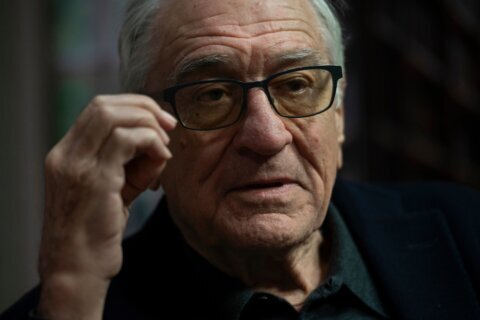WASHINGTON — It’s cranked out some of our favorite animated movies.
Now, it’s time to gather the kids for “DreamWorks Animation in Concert” at Wolf Trap on Thursday.
The National Symphony Orchestra will play live music set to clips from the studio’s most beloved movies, including “Shrek,” “Madagascar,” “Kung Fu Panda” and “How to Train Your Dragon.”
“DreamWorks has produced some of the most memorable animation in recent decades,” conductor Justin Freer told WTOP. “The idea here is to celebrate these composers and this great animation. It’s a wonderfully unique franchise celebration that touches upon all the fan-favorite moments.”
It all started with the hand-drawn animation of “The Prince of Egypt” (1998), telling the Biblical tale of Moses. The film earned an Oscar nod for Best Original Score (Hans Zimmer) and won Best Original Song (Stephen Schwartz) for “When You Believe,” performed by Whitney Houston and Mariah Carey.
“An incredible beautifully-painted picture [and] what a wonderful score by Hans Zimmer,” Freer said.
From there, DreamWorks found its biggest pop-culture smash with an ogre (Mike Myers), donkey (Eddie Murphy) and princess (Cameron Diaz) in “Shrek” (2001), earning an Oscar nomination for Best Adapted Screenplay. It also forced the Academy to create its very first Oscar for Best Animated Film (previously, Disney’s “Beauty and the Beast” (1991) was the only animated Best Picture nominee).
Numerous sequels followed, including “Shrek 2” (2004), which introduced Puss in Boots, “Shrek the Third” (2007), “Shrek Ever After” (2010) and the Broadway adaptation “Shrek the Musical” (2013).
On Thursday, the NSO will perform “Shrek” music by Harry Gregson-Williams and John Powell.
“I love ‘Shrek,'” Freer said. “Harry has done an amazing job helping us fall in love with these characters through his very charming music. … We have a wonderful ‘Shrek’ suite that celebrates various different visuals over the course of these wonderful movies … We’ll perform some of the Prince Charming music, and music from ‘Ride the Dragon,’ one of my favorite cues from the franchise.”
Amid the phenomenon of the “Shrek” saga, DreamWorks turned out another original idea with “Madagascar” (2005) about four animals (Ben Stiller, Chris Rock, David Schwimmer and Jada Pinkett Smith) who escape from New York Central Zoo and find themselves in Madagascar surrounded by lemurs (led by Sacha Baron Cohen). The film featured a score by Hans Zimmer.
DreamWorks had found itself another hit franchise over the course of several sequels, including “Madagascar: Escape 2 Africa” (2008), “Madagascar 3: Europe’s Most Wanted” (2012) and “The Penguins of Madagascar” (2014). A fourth installment “Madagascar 4” is due out in 2018.
“It’s hard not to remember the ‘Best Friends’ theme that Hans wrote,” Freer said. “This theme became one of the focal points of so many areas, characters and situations throughout not just the first film, but several others. I think some of the most recognizable music will come from some of the wonderful dancing at the zoo, and more dancing in the jungle, there’s a lot of really amazing music.”
The success continued with “Kung Fu Panda” (2008), which followed the overweight Po the Panda (Jack Black) who’s chosen as the Dragon Warrior despite his lack of skill in martial arts. The movie earned an Oscar nomination for Best Animated Film (2011), while its sequels attracted stars like Angelina Jolie for “Kung Fu Panda 2” (2011) and Bryan Cranston for “Kung Fu Panda 3” (2016).
“If you recall that wonderful scene where Po is finally learning the art of kung fu, ‘Training Po,’ which is a really wonderful scene that both Hans Zimmer and John Powell contributed to musically,” Freer said. “There’s a lot of light humor in it, there’s adventure in it, and a lot of really great ethnic instruments that we’ll have in the percussion section and elsewhere in the orchestra.”
“How to Train Your Dragon” (2010) earned an Oscar nomination for Best Animated Film, as well as another nomination for Best Original Score by John Powell. The sequel, “How to Train Your Dragon 2” (2012), was again nominated for Best Animated Film, while a third installment is due in 2018.
“We’ve got a number of different cues,” Freer said. “One of my favorites is actually from the first ‘How to Train Your Dragon’ … this wonderful moment with Toothless learning how to trust a human being for the first time, and what it is to earn the trust of a dragon. As they first go on their very first flying adventure, we play this scene with the music. John Powell’s music to both of these films, the first and second ‘Dragon,’ is, for me at least, some of the more powerful music written in the last while in film.”
The same year as “Dragon 2,” DreamWorks also produced “Rise of the Guardians” (2012). While the film itself is lesser known, its powerful music comes from the great Alexandre Desplat, who’s earned eight Academy Award nominations for a string of gems like “The King’s Speech” (2010), “Argo” (2012) and “The Imitation Game” (2014), not to mention a win for “The Grand Budapest Hotel” (2014).
“We’re tracing certain themes or elements or call it the DNA of DreamWorks Animation,” Freer said. “Take the idea of flying or flight, we collect all this wonderful footage from over 20 years that deals with this wonderful notion of flying from DreamWorks … create a montage and set that to a piece of music, in that case set to ‘The Sandman Returns’ from ‘Rise of the Guardians’ by Alexandre Desplat.”
Even if you’ve seen these movies countless times, you’ve never seen them quite like this.
“Imagine the National Symphony Orchestra, 85-pieces of incredible talent sitting on the stage breathing life into these films, these animated movies, these montages, these scenes in a way that you can only do with live musicians, under this wonderful setting at Wolf Trap,” Freer said.
Tickets to the DreamWorks Animation salute range from $25-$45. If you enjoy the show, you may also enjoy the NSO’s salutes to “Raiders of the Lost Ark” on July 9 and “The Firebird” on July 23.
“I’ve loved the art of film music since I was a child,” Freer said. “This art form is one of the most important in music history. … There is certainly an entertainment value, but there’s also a very serious value. … Our company began cine-concerts to preserve and present these types of things, whether they’re full movies or franchise celebrations. … It’s a great joy to be able to share this music.”
Click here for more concert information. Listen to the full interview with conductor Justin Freer below:








